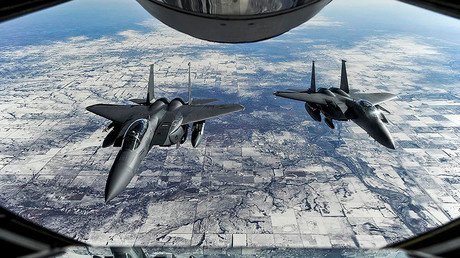The Trump administration is giving more leeway to field commanders and focusing on annihilating Islamic State forces, top US officials said. A proposal is also in the works to “deconflict” operations in Syria with Russia.
US forces are legally precluded from coordinating with the Russians, General Joseph Dunford, chairman of the Joint Chiefs of Staff, told reporters at the Pentagon on Friday. However, the US and Russian militaries have been maintaining multiple communication channels to “deconflict” operations in Syria.
“We have a proposal that we’re working on with the Russians right now,” Dunford added, declining to offer any details. He did say that it would address the presence of a Syrian government pocket in Deir ez-Zor, halfway down the Euphrates River between the IS (formerly ISIS/ISIL) stronghold of Raqqa and the Iraqi border.
“The Russians are as enthusiastic as we are to deconflict operations” and focus on fighting IS, Dunford said.
The comments came after Moscow condemned the US airstrike against a government-allied force near the Jordanian border as “illegitimate and unlawful.” Advisers with the Pentagon-backed Maghawir Al-Thawra militia group in the town of Tanf called in the strike.
Defense Secretary James Mattis described the targeted fighters as Iran-backed, rather than backed by the Syrian government, and called the airstrike “self-defense of our forces.”
“It was necessitated by offensive movement, of what we believe were Iranian-directed forces,” Mattis said, that acted “against the advice of the Russians.”
Mattis did not speculate whether the targeted forcers were directed by Iran’s Revolutionary Guards Corps or Hezbollah, but he did blame Iran for "extending a war that should have been done years ago.”
Dunford described the attack as “force protection,” adding that measures were being put into place to ensure such situations do not happen again.
Mattis also briefed reporters on the major changes to the strategy against IS adopted by the Trump administration.
“First, he delegated the authority to the right level to aggressively and in a timely manner move against the enemy vulnerabilities,” Mattis said. Secondly, the tactical objective shifted from pushing IS forces back in a battle of attrition to surrounding them in a war of annihilation.
IS forces have been surrounded both in the western parts of Mosul and in Raqqa, and “there is no escape” for them, Mattis said.
“We carry out an annihilation campaign, so we don’t simply translate this problem from one location to another,” Mattis said. “Our intent is that foreign fighters don’t get out.”
The US special envoy to the anti-IS coalition, Bret McGurk, described the US strategy as an "anaconda-like approach to suffocate ISIS of its territory, funds and propaganda.”
“The end of the phony caliphate is coming into sight,” he told reporters.
Giving field commanders more flexibility means that the White House is no longer micro-managing tactical actions on the ground, Mattis said.
McGurk illustrated the change by the example of Tabqa Dam west of Raqqa, which was taken by US-backed Syrian Democratic Forces (SDF) in March, when the opportunity presented itself.
“The delegation of authority has made a difference in terms of speed of execution,” McGurk said.
Trump also authorized the delivery of weapons and supplies to the Kurdish component of the SDF, and allowed US advisers to accompany local forces at battalion level, closer to the battle, Dunford said.
“We have been providing weapons to the Arab component for some months,” the general said, noting that deliveries to the Kurds have not started yet, but that the Pentagon has been stockpiling materials in anticipation of Trump’s decision.
Asked if moving the advisers forward would put more US personnel in harm’s way, Mattis said that the troops know their job, which is to support their local partners, not do the fighting for them.
“Barbara, when you’re on patrol you can’t always be in a safe position,” Mattis told CNN correspondent Barbara Starr. “The lads know they’re not part of a life insurance corporation. They’re trained for this, and they go out and they do their job the best they can.”
Asked about reports that the Turkish government has requested his dismissal, McGurk brushed them off as “tactical differences,” praising Turkey as a strategic ally and adding that “we cannot defeat ISIS without Turkey.”
He did say that the US will “never work with the Assad regime” in Syria, however.

